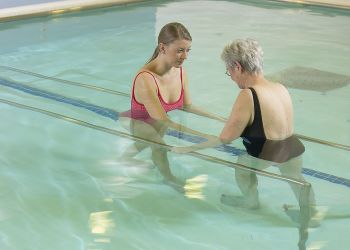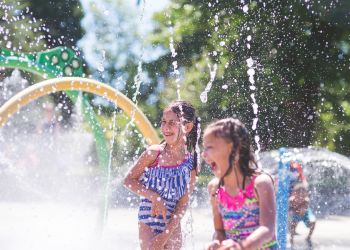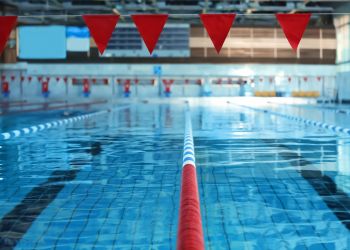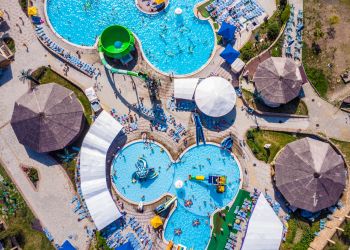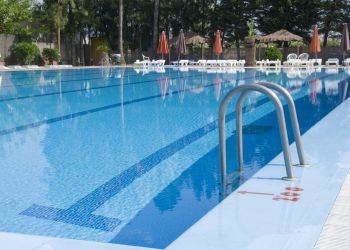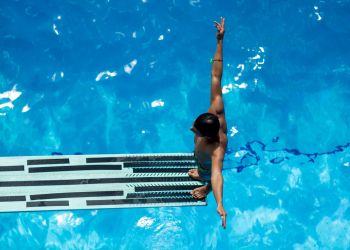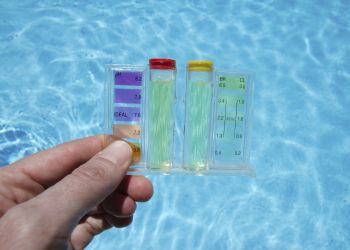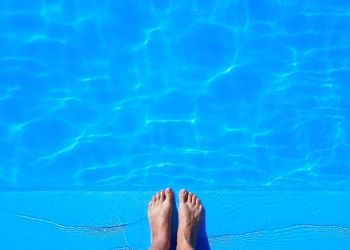Model Aquatic Health Code

The Centers for Disease Control and Prevention's Model Aquatic Health Code (MAHC) is a set of guidelines intended to prevent injury and illness at public aquatic venues, such as pools, hot tubs, and splash pads, and created in a collaborative effort between public health officials and aquatics sector leaders.
The MAHC Network is a community for MAHC users, subject matter experts, and those hoping to learn about the code itself. Members will receive updates on the code, have access and provide input to newly developed resources, and join bi-monthly webinars featuring the code and users.
| Date | Title | Description | Information |
|---|---|---|---|
| February 2024 | Using Environmental Health Data to Inform Pool Regulatory Efforts in the City of Long Beach, California | The City of Long Beach (California) Water Quality Program, through a grant from the CDC, is utilizing environmental health data to evaluate an intervention conducted for lower-compliance public pools and spas. The intervention includes a self-inspection checklist used by pool operators and their maintenance staff to increase awareness, knowledge, and compliance. Learn about the City of Long Beach’s results to date and lessons learned along the way for other health departments looking to do similar work. | Webinar Recording Slides Webinar Q&A |
| December 2023 | Waterborne Infectious Disease Burden and Recreational Water-Associated Illness in the United States | Join Shanna Miko, DNP, MPH, and Michele Hlavsa, RN, MPH of the CDC on December 4 from 2-3pm ET to learn about the latest research on the burden of waterborne infectious disease, with a particular focus on estimates and prevention of recreational water-associated illness. Learn about how the CDC has created a suite of prevention resources, including the Model Aquatic Health Code (MAHC), to help prevent recreational water-associated illness. | Webinar Recording Slides Webinar Q&A |
| July 2023 | Implementation of the Model Aquatic Health Code in Pueblo County, CO | The Pueblo Department of Public Health and Environment shared their experience adopting the MAHC in 2022, and implementing and enforcing the new codes after adoption. They also shared best practices and lessons learned for local jurisdictions who are looking to do the same. | Webinar Recording Slides Webinar Q&A |
| May 2023 | Swimming Safe with the Latest Edition of the Model Aquatic Health Code | Local jurisdictions joined NACCHO, the CDC, and the Council for the Model Aquatic Health Code to review the latest changes to the 4th edition of the MAHC and look to the 5th edition update cycle to learn how local health departments can contribute to submitting change requests. | Webinar Recording Slides |
| February 2023 | Indoor Air Quality in Swimming Facilities: Dynamics of Gas-Phase Trichloramine | Trichloramine is a disinfection byproduct found in chlorinated swimming facilities from reactions between chlorine and the body waste of swimmers (e.g., sweat and urine). Exposure to trichloramine has been linked to asthma and can irritate respiratory airways, skin, and eyes. In this webinar, attendees learned the importance of taking steps to prevent gas-phase trichloramine production in their indoor pool facilities. | Webinar Recording Slides |
| November 2022 | Interim Guidance for Safe Operation of Artificial Swimming Lagoons | The webinar describes how artificial swimming lagoons work and the interim guidance developed in collaboration with the CMAHC Ad Hoc Committee, the CDC, and partners, on design and construction as well as operation and maintenance of the lagoons. | Webinar Recording Slides |
| May 2022 | Considerations for Increased Risk Venues | To promote healthy and safe swimming, this webinar highlights increased risk venues such as spray pads, wading pools and therapy pools. Dewey Case of the CMAHC joins us to discuss what makes a venue increased risk and how these risks can be mitigated using guidance from the MAHC. | Webinar Recording Slides |
| February 2022 | Provisional Model Aquatic Health Code Updates | The CDC discusses change requests (CRs) provisionally accepted by the agency for the 4th edition of the MAHC. | Webinar Recording Slides |
| October 2021 | Swimming Safely: Preventing Unintentional Drownings | To support local health departments in better understanding their role in preventing unintentional drownings, this webinar shares the latest national data and trends and highlights a successful drowning prevention program in Broward County, Florida. | Webinar Recording Slides |
| May 2021 | Healthy and Safe Swimming Week Showcase - Ensuring Aquatic Health in Your Community | Experts from the CDC highlight a Morbidity and Mortality Weekly Report outlining outbreaks in the United States associated with treated recreational water that occurred during 2015–2019. Speakers also showcase CMAHC’s State Designee Committee, a forum to discuss lessons learned and best practices for safe swimming at the State level. | Webinar Recording Slides |
| February 2021 | Results from Vote on the Code: A Review of Key Proposed Changes for the MAHC 4th Edition | Representatives of the CMAHC summarize proposed updates to the CDC’s MAHC. The MAHC 4th Edition is expected to be released in the summer of 2021. | Webinar Recording Slides |
| October 2020 | Updating Pool Codes at the Local Level | In 2020, NACCHO, with support from the CDC, launched the Aquatic Health and Safety Pilot Program to assist local health departments in reviewing, revising, and stregthening aquatic facilities' codes using the MAHC. Two program participants share their experiences and lessons learned. | Webinar Recording Slides |
| August 2020 | Ensuring Aquatic Health and Safety: Updating the Model Aquatic Health Code | In anticipation for the Vote the Code Conference in October 2020, panelists on an August 18 webinar discuss the process of developing, discussing, and voting on proposed changes to the MAHC. | Webinar Recording Slides |
| May 2020 | Healthy and Safe Swimming at Public Aquatic Venues during the COVID-19 Pandemic | Jennifer Murphy, PhD and Michele Hlavsa, RN, MPH of the CDC and Dewey Case, of the CMAHC discuss considerations for aquatic venues during the COVID-19 pandemic. | Webinar Recording Slides |
| February 2020 | Putting the MAHC into Action at a Local and Regional Level | Dewey Case provides an overview of the YMCA's aquatic safety guidelines and how MAHC fits into those guidelines; he also discusses challenges of implementing MAHC at a local and regional level. | Webinar Recording Slides |
| October 2019 | Understanding the Process to Help Update the MAHC | Learn more about the process for updating the MAHC, including how to prepare and submit a Change Request (CR), the role of the Technical Review and Technical Support Committees, the 2020 Vote on the Code Conference, voting on CRs, and opportunities to get involved. | Webinar Recording Slides |
| July 2019 | Drowning is Preventable | A webinar with Sarah Chaires, Family Nurse Practitioner and medical provider at UNC Hospitals Level 1 Trauma Center, who discusses the benefits of using the CDC’s MAHC to prevent drowning. | Webinar Recording Slides |
| May 2019 | Pool Chemistry for Healthy and Safe Swimming Week | In recognition of Healthy and Safe Swimming Week, learn about the latest epidemiologic data on pool chemical injuries and how you can prevent these incidents as a pool operator or inspector. | Webinar Recording Slides |
| March 2019 | Floatation Tanks: A Review and Discussion of MAHC Requirements | Douglas Sackett, the Executive Director of the Council for the Model Aquatic Health Code, reviews and discusses the MAHC requirements for floatation tanks. | Webinar Recording Slides |
| January 2019 | Indoor Air Quality and Swimming Facilities | Ernest R. Blatchley III, Ph.D, Professor in Environmental Engineering at Purdue University, presents a study launched in January 2019 to collect data illustrating relationships between the operational features of indoor swimming pool facilities and indoor air quality. | Webinar Recording Slides |
For more MAHC Network webinars, visit NACCHO's YouTube Playlist.
Follow the instructions below to join the MAHC Network and receive announcements about upcoming webinars and other opportunities.
- Log in to MyNACCHO (or create a free account).
- Go to “My Subscriptions.”
- Check the box next to "The Model Aquatic Health Code (MAHC) Network" (and any other e-newsletters you wish you receive).
- Click “Save” at the bottom of the page.
Join our Community of Practice
NACCHO's MAHC Network Community of Practice provides a space for individuals who are interested in, or work with, MAHC. This community forum can be used to share information, best practices, and resources relevant to MAHC, and allow for participants to virtually network with others who work in this area of public health. To join, go to https://virtualcommunities.naccho.org/communities/allcommunities and search for "Model Aquatic Health Code Network."
Have questions? Email [email protected].
